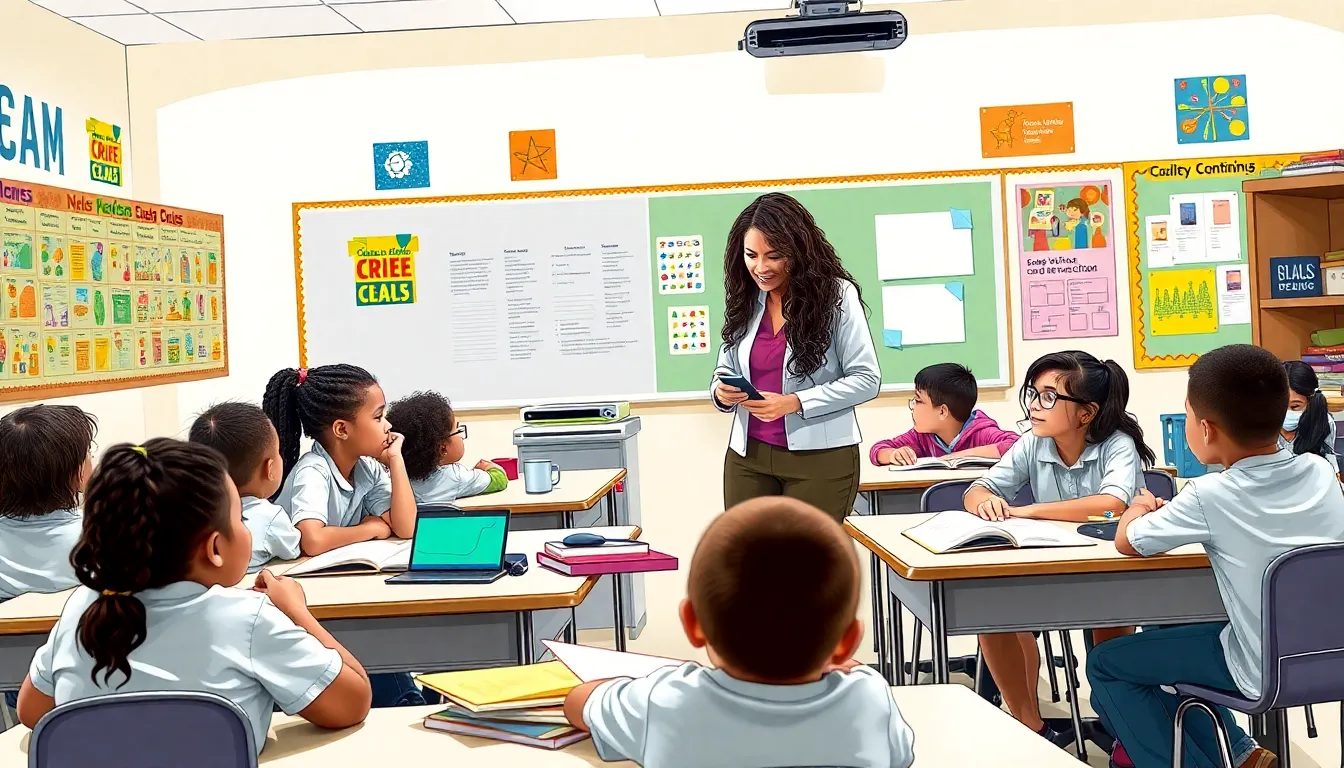Phone:
(701)814-6992
Physical address:
6296 Donnelly Plaza
Ratkeville, Bahamas.

When it comes to education, Louisiana often finds itself in the spotlight—though not always for the reasons locals would prefer. With a vibrant culture and rich history, you’d think the state’s education system would shine just as brightly. Instead, it sometimes feels like it’s playing a game of hide-and-seek with the rankings.
But don’t let the numbers fool you; beneath the surface, there’s a wealth of potential waiting to be unleashed. As schools strive to improve and innovate, understanding Louisiana’s education ranking can shed light on the challenges and triumphs faced by students and educators alike. So grab your favorite beignet and let’s dive into the fascinating world of Louisiana’s education landscape, where every statistic tells a story and every classroom has the potential to make a difference.
Louisiana consistently ranks among the lower tiers in national education assessments. The state often faces challenges that impact its overall educational outcomes, such as funding disparities and high student dropout rates. Despite these setbacks, progress is measurable in specific areas.
Student performance, reflected in standardized testing scores, positions Louisiana below the national average. For instance, the National Assessment of Educational Progress (NAEP) shows that Louisiana students score lower in reading and math compared to their peers nationwide. The U.S. News & World Report ranks Louisiana’s public schools near the bottom, highlighting the need for systemic improvements.
Educators and policymakers recognize the potential for growth. Efforts to enhance teacher training and curriculum development show promise. Programs that focus on early childhood education have garnered attention for their positive impact on readiness and long-term academic success. The average graduation rate stands at approximately 80%, indicating an upward trend despite historical challenges.
Investment in education is critical. Funding has increased in recent years, aiming to provide resources for both teachers and students. School initiatives targeting at-risk populations demonstrate a commitment to address disparities. Data reveals that some districts are making strides in closing achievement gaps.
Collaboration among stakeholders plays a vital role. Schools, community organizations, and families are working together to foster a supportive learning environment. Such partnerships enhance the educational experience, offering resources and mentorship opportunities.
Louisiana’s education ranking highlights both obstacles and opportunities for improvement. The landscape is evolving, reflecting ongoing efforts to transform the educational framework into one that prioritizes student success.

Education rankings in Louisiana are influenced by several critical elements that impact student performance and overall success. Understanding these factors sheds light on the state’s educational landscape.
Funding directly correlates with educational quality. States with higher investment in education typically show better student performance. Louisiana faces significant funding disparities, affecting resource availability in public schools. Students often lack access to updated textbooks, technology, and facilities. Research indicates that low-income districts in Louisiana receive less funding than their more affluent counterparts. This gap widens educational inequality, hindering learning opportunities for disadvantaged students. Additionally, inadequate funding limits extracurricular activities and after-school programs, impacting student engagement and development. Investing in educational resources could enhance learning outcomes and ultimately improve Louisiana’s education ranking.
Teacher quality plays a vital role in shaping educational outcomes. Experienced, well-prepared teachers contribute significantly to student achievement. In Louisiana, teacher retention rates have been challenging, with many educators leaving the profession early. This turnover disrupts student learning and continuity in the classroom. Programs aimed at enhancing teacher training and professional development have started to show positive effects. Schools prioritizing effective teaching practices tend to see better student performance metrics. Moreover, collaborative teaching environments enable educators to share strategies and resources, ultimately enriching the learning experience for students. Improving teacher quality remains essential for elevating Louisiana’s education rankings.
Louisiana’s education ranking varies when compared to other states. This comparison highlights both regional differences and national trends that impact its overall performance.
Regional differences in Louisiana’s education ranking show distinct patterns. The northern part of the state faces more significant challenges with funding and resources than the southern region, which includes urban centers like New Orleans. Furthermore, rural districts often struggle with access to quality educational facilities. Schools in Baton Rouge and New Orleans tend to perform better due to concentrated efforts on reform and funding. Increased investment in teacher training programs appears promising, but disparities within the state still contribute to uneven educational outcomes.
National trends reveal that Louisiana consistently ranks lower than many states in critical areas like math and reading. Data from assessments indicate Louisiana students score below the national average, reflecting systemic issues that affect educational quality. Although some Midwest and Northeast states show higher achievement levels, Louisiana’s recent initiatives demonstrate a commitment to change. Enhanced early childhood education and focused resource allocation aim to elevate rankings and improve student engagement. These trends suggest that while challenges exist, the potential for significant improvement is on the horizon.
Louisiana’s education landscape continues to evolve through recent legislative and programmatic adjustments. These changes aim to address persistent challenges in the state’s education system.
State legislators recently enacted measures targeting educational reform and funding improvements. Such actions include the establishment of a new funding formula aimed at providing equitable resources across districts. Increased financial allocations focus on low-income areas, addressing disparities in educational quality. Recent bills promote teacher retention through salary incentives and mentorship programs, encouraging experienced educators to remain in the classroom. Efforts to enhance early childhood education funding signal a commitment to improving foundational learning for Louisiana’s youngest students.
Innovative programs are emerging within Louisiana’s educational framework. Schools are implementing improved teacher training initiatives that emphasize classroom management and instructional strategies. Collaborative approaches between schools and community organizations are enhancing student support services. Advanced placement programs are being expanded, increasing opportunities for high school students to earn college credits. Adoption of technology-based learning tools allows for personalized education experiences, which cater to diverse learning styles. Enhanced after-school programs aim to assist at-risk youth, providing additional resources for academic success.
The future of education in Louisiana shows promise due to recent legislative reforms and community initiatives. Increased funding allocations target low-income districts, aiming to provide equitable resources across schools. Initiatives to improve teacher retention use salary incentives and mentorship programs, directly addressing high turnover rates.
Progress in teacher training programs indicates a shift toward elevating educational quality. Significant advancements in technology-based learning tools enhance student engagement and participation. Students now benefit from improved after-school programs tailored for at-risk youth, supporting their academic journeys.
Predictably, expanded advanced placement opportunities create pathways for higher academic achievement. Public awareness about educational challenges fosters collaboration among schools, community organizations, and families, strengthening the support network. Consistent efforts to uplift education signal a real commitment to overcoming past hurdles.
A closer look at the northern and southern regions reveals differing resource availability, affecting overall performance. Urban centers continue to drive reform efforts through innovative practices, resulting in stronger outcomes. Reports from U.S. News & World Report highlight gradual improvements in rankings, reflecting the collective impact of these changes.
Louisiana’s education system evolves through targeted reforms and community support. By addressing funding disparities and improving teacher quality, the state advances toward a brighter educational future. Optimistic trends in graduation rates illustrate the effectiveness of these interventions, suggesting potential for continued growth.
Louisiana’s education system is on a transformative path despite its ongoing challenges. Recent reforms and community efforts are laying the groundwork for a brighter future. Increased funding and targeted initiatives are addressing disparities and enhancing the quality of education across the state.
The commitment to improving teacher training and retaining qualified educators is crucial for elevating student success. As collaboration among schools, families, and organizations strengthens, the potential for positive change becomes more evident.
With gradual improvements in graduation rates and rankings, Louisiana is poised for continued growth in its educational landscape. The journey may be long but the collective efforts are paving the way for a more equitable and effective education system.